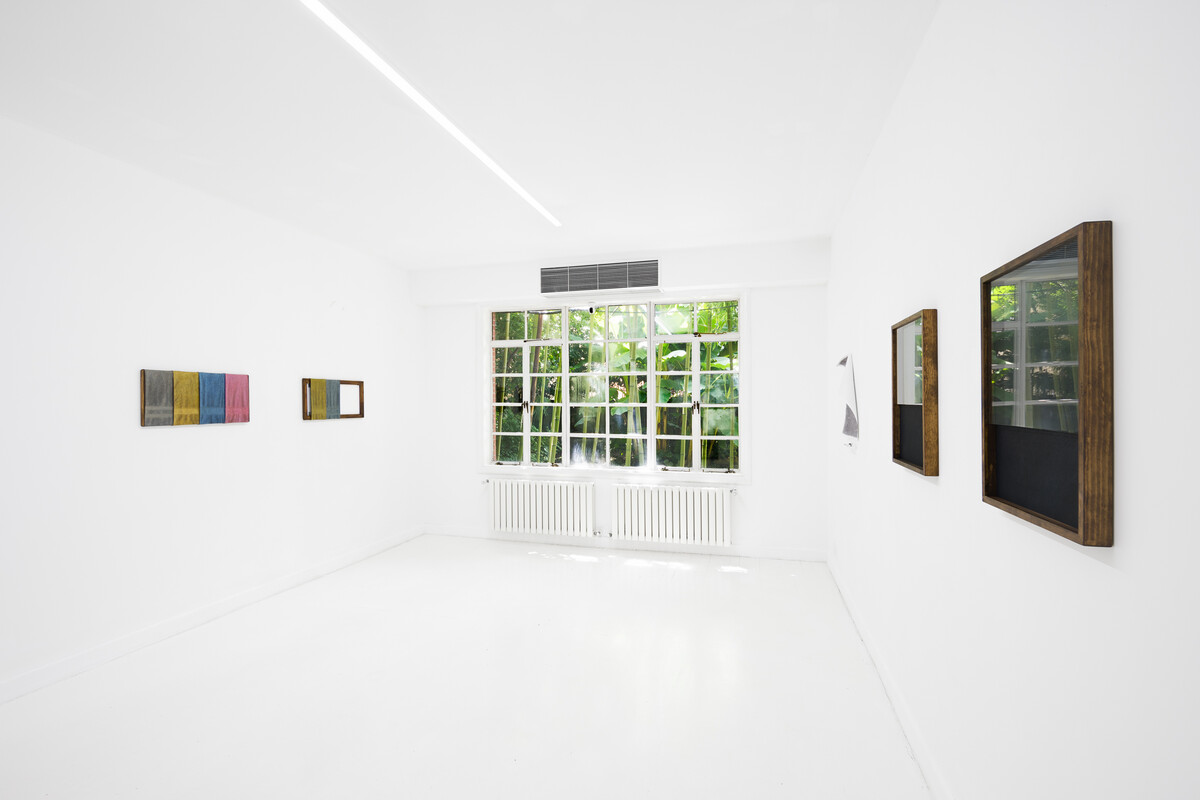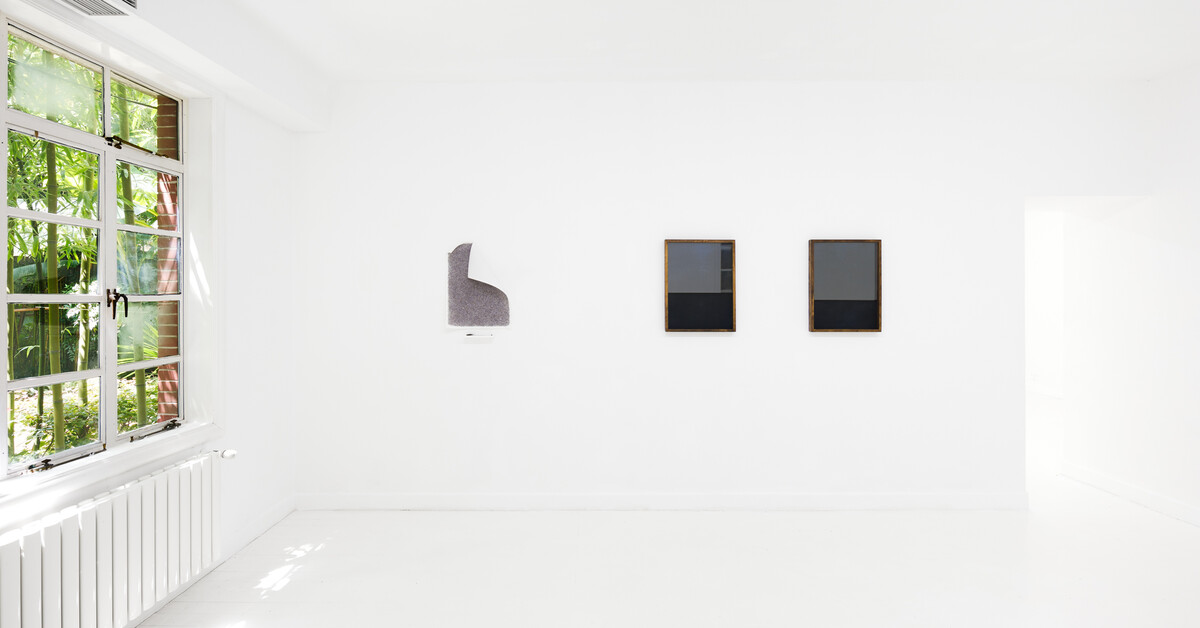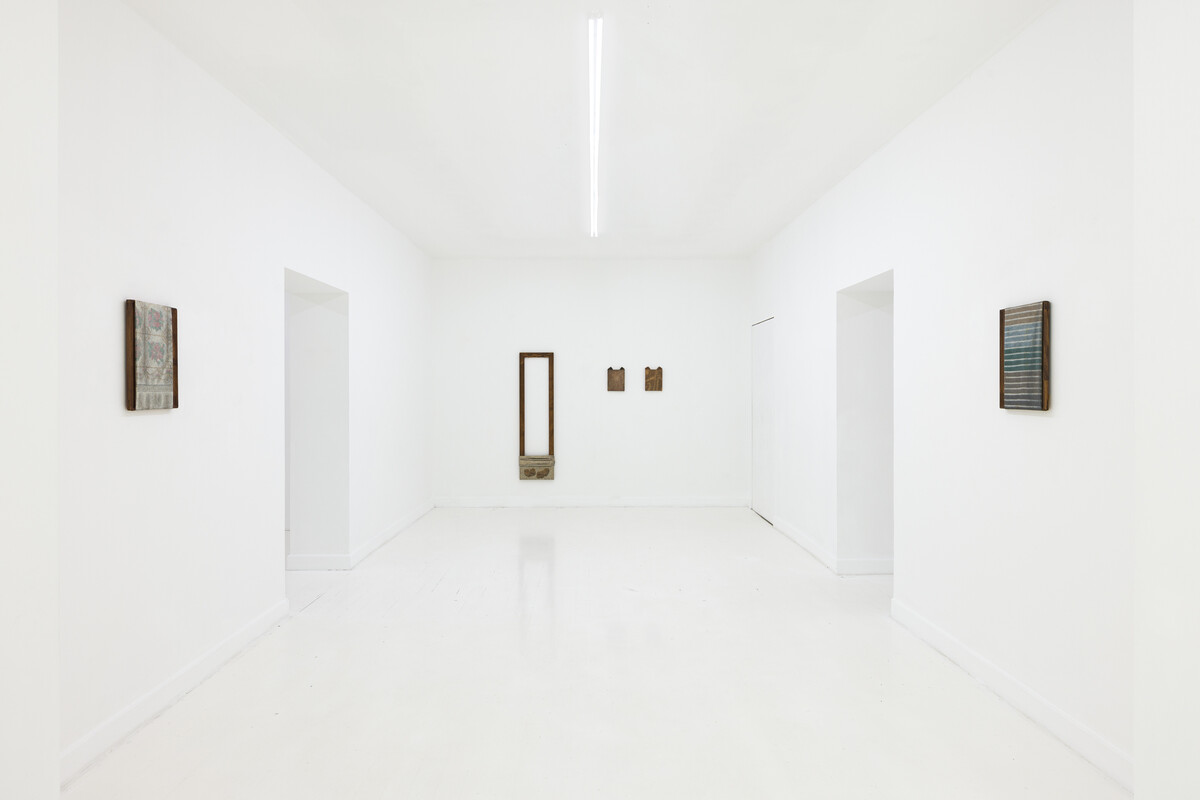Ryosuke Kumakura’s interest lies in the relationship between artistic practise and mundane activities. Inspired by everyday objects, his still-lives break the boundary between painting and daily experience. Reimagining the physicality of the canvas, he highlights its texture and sculptural quality, and captures the natural state of common objects, such as socks and towels, in a two-dimensional space.

Frequently on the move over the past few years, the artist tangles with the concept of habituation, and contemplates how we adapt to new environments and the consequent emotional impact. Just as setting up his studio and making works award the artist a familiarity that eases the transition into a strange = surrounding, custom and routine are cornerstones in the construction of a physical and emotional sanctuary. Each experience of moving house prompts Kumakura to re-evaluate his habits and the marks they make, and reflect on their underlying psychological drive. In the juggle of old customs and new stimuli, decisions are made to reinforce or abandon existing ways of being in the hope of a material and emotional renewal of the self.
By exposing the meticulously treated stretchers, Kumakura has blurred the boundary between the works and the living / exhibition spaces. This is most evident in the “Night Window” series. Charcoal drawings of nocturnal scenes are contained in window-like wooden frames and partially covered by double-pane glass, obscured by the reflection of the glazing. Looking at the works is vividly reminiscent of gazing through a half-open window at the hazy silhouette of trees under the moonlight. The artist fabricated the charcoal by burning winter branches from his courtyard. The use of domestically sourced materials and the control on the physical makeup of the work fortify the tie between the work and daily life. The series was first started when the artist moved from New York to New Hampshire. Consequently, the night outside his window changed from city lights to shadows of the woods. Through his deft visual play with the dark charcoal drawing and the reflection on the glass, a viewing difficulty otherwise regarded as a curatorial flaw is transformed into an emotional tension of desolation and eeriness. In the attempt to see the darkness of the unknown, one cannot help but catch their own reflection.

The “Socks” and “Towel” series, while deceiving the viewer with their illusory texture of fabrics, embody Kumakura’s observation of and affection for his family members. The act of taking off socks signifies a peculiarly intimate state of mind that differs from the casualness of taking off a coat or the privacy of removing undergarments. It represents a moment of ease and security. Compared to his other works, these paintings are larger in size due to the exposed, narrow wooden stretchers, which take the shape of long mirrors. While the half-filled emptiness within the stretchers reflects the absence of a person in the “mirror”, the canvas stacked and creased at the bottom resembles socks strewn on the floor that still retain the wrinkles from being worn, implying human traces. The “Towel” series began when the artist started living with his partner and learning the other person’s idiosyncrasies. His partner’s habit of folding towels neatly on the rack inspired him to ponder over the similarities between towels and canvases, not only in terms of their texture, but also their potential as mediums of emotions. From the series, the paintings of towels with stripes and floral patterns stand out from the remaining monochromatic “towels” in this exhibition; the towels depicted in these two works were left by the artist’s mother at his home. The works convey the artist’s appreciation of and affection towards his loved ones for these aesthetic choices on domestic trivia, considered or subconscious, are telling of the choice maker’s character.
Kumakura’s acute perception of details extends from his personal life to his studio practise. Once in the process of stretching a canvas, he noticed that the randomly folded fabric coincidentally resembled a cat’s ear, which inspired the iconic form of the “Cat” and “Fur” series of paintings. Taking as a starting point the pre-existing structure of the painted material, he started to create portraits of cats, a creature he deems reliable but not necessarily friendly, speaking from his experience of growing up with the animal: “A person’s relationship with their cat is like a painter’s relationship with painting.” In the exhibition, two cats on the canvas sit on a pile of used towels by the window, gazing back in profound silence. The “Fur” series directs the viewer’s eyes to the surface of the canvas, as Kumakura explores the expressive potential of the material by recreating cat fur and patterns through the texture of the fabric and the brush strokes.
In the drawing installation Practice (2023), the artist’s intention was to rebuild his relationship with certain everyday objects. “I have always had a complicated relationship with plastic pens,” says Kumakura when describing the dilemma of the plastic pen as an essential but underappreciated object. When making the work, he has accomplished something that he (and many of us) had never done before using up the ink of an entire ballpoint pen. Through repetitively drawing the sign of a star on a piece of paper, the ink transforms into a sky of dark constellations. Although a pentagram is far from a realistic representation of the luminous celestial bodies, its meaning is a universal consensus. This familiar convention becomes strange and challenging as a result of repetition. The draping of the paper at the corners lures the viewer to discover upon closer inspection that against the starry sky, translucent plastic pushpins scatter on the paper in the shape of the Cancer constellation. Pens and pushpins, common and overlooked, reincarnate into twinkling stars high above. The disassembled body, cap, and exhausted refill of the pen laying below the drawing sparkle with a crystalline shimmer, commemorating the infinite possibility of ordinary beings under contemplation and reconstruction.

All artworks are self-portraits. Ryosuke Kumakura’s paintings mirror the quality of introspection and sensitivity in his nature while extending an invitation to the viewer to reexperience his moments of solitude, tenderness and humor in a time of change. Encapsulating the many thoughts and emotions that gave birth to the works on view, the word “habituation”, as the artist reflects, conjures a river of images in his mind:
Birds scared of a scarecrow accustomed to the situation, so they can fly around;
Foster care children going through so many changes to become a new family member;
A husband picking up his favorite picture to make a new house as a “home”;
Big waves slowly calming down, then becoming a tranquil ocean;
A street cat appears in your house every day.

Courtesy of the Artist and Capsule Shanghai. Photo by Ling Weizheng.
Frequently on the move over the past few years, the artist tangles with the concept of habituation, and contemplates how we adapt to new environments and the consequent emotional impact. Just as setting up his studio and making works award the artist a familiarity that eases the transition into a strange = surrounding, custom and routine are cornerstones in the construction of a physical and emotional sanctuary. Each experience of moving house prompts Kumakura to re-evaluate his habits and the marks they make, and reflect on their underlying psychological drive. In the juggle of old customs and new stimuli, decisions are made to reinforce or abandon existing ways of being in the hope of a material and emotional renewal of the self.
By exposing the meticulously treated stretchers, Kumakura has blurred the boundary between the works and the living / exhibition spaces. This is most evident in the “Night Window” series. Charcoal drawings of nocturnal scenes are contained in window-like wooden frames and partially covered by double-pane glass, obscured by the reflection of the glazing. Looking at the works is vividly reminiscent of gazing through a half-open window at the hazy silhouette of trees under the moonlight. The artist fabricated the charcoal by burning winter branches from his courtyard. The use of domestically sourced materials and the control on the physical makeup of the work fortify the tie between the work and daily life. The series was first started when the artist moved from New York to New Hampshire. Consequently, the night outside his window changed from city lights to shadows of the woods. Through his deft visual play with the dark charcoal drawing and the reflection on the glass, a viewing difficulty otherwise regarded as a curatorial flaw is transformed into an emotional tension of desolation and eeriness. In the attempt to see the darkness of the unknown, one cannot help but catch their own reflection.

The “Socks” and “Towel” series, while deceiving the viewer with their illusory texture of fabrics, embody Kumakura’s observation of and affection for his family members. The act of taking off socks signifies a peculiarly intimate state of mind that differs from the casualness of taking off a coat or the privacy of removing undergarments. It represents a moment of ease and security. Compared to his other works, these paintings are larger in size due to the exposed, narrow wooden stretchers, which take the shape of long mirrors. While the half-filled emptiness within the stretchers reflects the absence of a person in the “mirror”, the canvas stacked and creased at the bottom resembles socks strewn on the floor that still retain the wrinkles from being worn, implying human traces. The “Towel” series began when the artist started living with his partner and learning the other person’s idiosyncrasies. His partner’s habit of folding towels neatly on the rack inspired him to ponder over the similarities between towels and canvases, not only in terms of their texture, but also their potential as mediums of emotions. From the series, the paintings of towels with stripes and floral patterns stand out from the remaining monochromatic “towels” in this exhibition; the towels depicted in these two works were left by the artist’s mother at his home. The works convey the artist’s appreciation of and affection towards his loved ones for these aesthetic choices on domestic trivia, considered or subconscious, are telling of the choice maker’s character.
Kumakura’s acute perception of details extends from his personal life to his studio practise. Once in the process of stretching a canvas, he noticed that the randomly folded fabric coincidentally resembled a cat’s ear, which inspired the iconic form of the “Cat” and “Fur” series of paintings. Taking as a starting point the pre-existing structure of the painted material, he started to create portraits of cats, a creature he deems reliable but not necessarily friendly, speaking from his experience of growing up with the animal: “A person’s relationship with their cat is like a painter’s relationship with painting.” In the exhibition, two cats on the canvas sit on a pile of used towels by the window, gazing back in profound silence. The “Fur” series directs the viewer’s eyes to the surface of the canvas, as Kumakura explores the expressive potential of the material by recreating cat fur and patterns through the texture of the fabric and the brush strokes.
In the drawing installation Practice (2023), the artist’s intention was to rebuild his relationship with certain everyday objects. “I have always had a complicated relationship with plastic pens,” says Kumakura when describing the dilemma of the plastic pen as an essential but underappreciated object. When making the work, he has accomplished something that he (and many of us) had never done before using up the ink of an entire ballpoint pen. Through repetitively drawing the sign of a star on a piece of paper, the ink transforms into a sky of dark constellations. Although a pentagram is far from a realistic representation of the luminous celestial bodies, its meaning is a universal consensus. This familiar convention becomes strange and challenging as a result of repetition. The draping of the paper at the corners lures the viewer to discover upon closer inspection that against the starry sky, translucent plastic pushpins scatter on the paper in the shape of the Cancer constellation. Pens and pushpins, common and overlooked, reincarnate into twinkling stars high above. The disassembled body, cap, and exhausted refill of the pen laying below the drawing sparkle with a crystalline shimmer, commemorating the infinite possibility of ordinary beings under contemplation and reconstruction.

Courtesy of the Artist and Capsule Shanghai. Photo by Ling Weizheng.
All artworks are self-portraits. Ryosuke Kumakura’s paintings mirror the quality of introspection and sensitivity in his nature while extending an invitation to the viewer to reexperience his moments of solitude, tenderness and humor in a time of change. Encapsulating the many thoughts and emotions that gave birth to the works on view, the word “habituation”, as the artist reflects, conjures a river of images in his mind:
Birds scared of a scarecrow accustomed to the situation, so they can fly around;
Foster care children going through so many changes to become a new family member;
A husband picking up his favorite picture to make a new house as a “home”;
Big waves slowly calming down, then becoming a tranquil ocean;
A street cat appears in your house every day.
